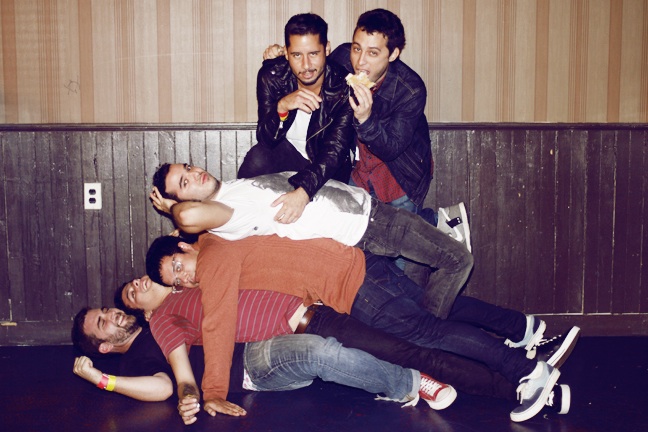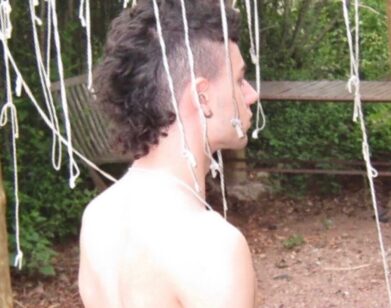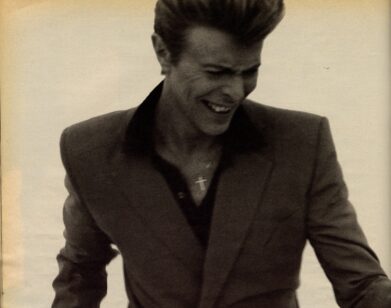Kneeling at the Altar with Davila 666

DAVILA 666. PHOTO BY ANDREW DE FRANCESCO.
The six members of Davila 666 use “Davila” as a surname, à la the Ramones, and call San Juan, Puerto Rico home. In press releases and online, they describe their dynamic as “Menudo on lots of drugs.” But their sound, a blend of beach-swerving punk and hazy garage, places them stylistically (and on tour dates) with Miami’s Jacuzzi Boys, King Khan, and defunct vets of The Smell, Mika Miko. Two years ago, the L.A.-based label at the forefront of the latest garage-rock revival, In the Red, released their self-titled full-length. It’s one of those albums that rolls and jolts by on a profligacy of streetwise melody three times before you notice (the cop tailing you). Part of the catchiness, and the band’s appeal, can be attributed to the song lyrics—or lack thereof, since lead singer Carlitos Davila records and performs in a broken, simplified Spanish that oddly intensifies the party blur. We spoke with Carlitos before a show at the Knitting Factory about their new EP, Mala, the political and cultural climate and state of street art in Puerto Rico, and what items are required in building a proper rock-‘n’-roll altar.
HUNTER STEPHENSON: When the band does interviews the language barrier must come up frequently…
CARLITOS DAVILA: We get a lot of questions about it, yeah, but we expect them. I don’t think the language barrier matters. The songs, they’re catchy enough. But the songs aren’t really about what we’re saying. It’s about how they make listeners feel. We write our songs as we record them. We’ll record a riff as we come up with it, and then we add a drumbeat, a bass line. I record my vocals phonetically, and later I fill them in with lyrics. I used to have an underground rap group in Puerto Rico, our bassist used to make the beats. Then I got into rock-‘n’-roll and the songs sounded way better. But it’s the same! We still make the beat and record while we’re going.
STEPHENSON: You guys are sometimes described as the ambassadors of punk rock in Puerto Rico. But you lived in Seattle for a while, right?
DAVILA: I lived in Seattle for two or three years, but we’re from San Juan and we still live there. I guess we’re considered the ambassadors because we’re the band that left the country to play elsewhere. [LAUGHS] It doesn’t happen much. We have the same 200 kids in Puerto Rico who have been coming to our shows, going back five years now. It’s not growing. [LAUGHS] A lot of kids don’t seem to be opening their minds to rock-‘n’-roll. It’s different for us, in that I think we’re closer than most bands and we’re geeks. We’re constantly following music together and seeking out albums and record labels. I was really into bands on In the Red before we signed with them, like the Clone Defects and The Dirtbombs. Crypt Records was a big one for me when I got into garage. It’s weird, in that there were never any great record stores in Puerto Rico growing up. Thankfully, there’s a guy in San Juan, out in the suburbs. He’s been collecting old rock-‘n’-roll records since the ’60s. His entire house is covered in them, and his selection is always changing. He likes to open up his house with his buddies until 5 o’clock. He gives you coffee and pastries. We just dig, man. Great stuff. Super cheap. These days, kids can order records online and download music, like they do here, but not as many as you would think.
STEPHENSON: You said the lyrics to the songs don’t mean much. But what is Mala, the new EP, about for you?
DAVILA: The title track from the EP is about bad situations all around. “Bad” meaning bad, like shitty. Going to a party and having your wallet stolen in the bathroom.
STEPHENSON: How does that happen? [LAUGHS]
DAVILA: It happened in Puerto Rico. [LAUGHS] And the song “Yo Siero Otro” is a love song; that song and “Mala” will be on our new LP, which is done and comes out in February. We waited until the last possible minute to record it, waited for the pressure to build on us, and then we recorded it in our bassist’s room in three weeks. We pushed out 25 songs. We write a lot of love songs—it’s just that sometimes they are love songs to drugs. I feel like the new album is moving away from the punker stuff. The Jesus & Mary Chain was a major influence on us and the album, and The Velvet Underground. Our music is getting more psychedelic.
STEPHENSON: Over the summer, I was in San Juan. Was anyone in the band involved in the student protests at the University of Puerto Rico occurring at that time? It seemed like a big deal.
DAVILA: We were not. Politics in Puerto Rico are a joke. It’s like football in America, where there are teams that people root for, no matter what type of people are on them.
STEPHENSON: Yeah. I think that extends to politics here as well.
DAVILA: Yeah, but in Puerto Rico the government is corrupt in a way where they manipulate the situations and try to make everything private. And the student protests, the government wanted to make the University of Puerto Rico private, basically. The government there is just corrupt, man. It always comes back to money. They love money, they love power. And they suck. I try to stay away from all of the politicians. It’s all the same. It’s Republican and liberal Republican. We stay away from it. At the same time, we’re a very social band.
STEPHENSON: The graffiti just outside of San Juan really surprised me. The colors and the pieces were incorporated into the landscape, rather than in conflict with it. How is street art generally accepted there?
DAVILA: It’s interesting because lately I think it is more permissible. Up until recently, it was a crime. You could be charged with serious vandalism. But graffiti artists in Puerto Rico are sick. They don’t get a lot of coverage. So much of the work, you can’t say it’s a tag or a “throw-up.” It tends to be more complex. I think a few artists are being commissioned, now.
STEPHENSON: One of your more popular songs is still “Tu.” Does the video [ABOVE] exemplify your lifestyle or parties back home, excluding the ending?
DAVILA: Yeah, it was shot there. Our bassist, AJ, had a friend who passed away, and the house in the video is her family’s. They used to go that house as teenagers to get drunk, stoned, do teenage things. Our tambourine player used to hang there too. But then at the ending of the video, yeah, people are pulling out knives, it becomes horrific. It’s a metaphor for making someone comfortable around you and then ruining it completely. Except necks are cut open.
STEPHENSON: Occasionally, you guys like to conjure up mystical imagery, the dark arts…
DAVILA: Yeah. Santeria is an influence on us. Our last album cover was an altar. We wanted to make it look like an old, forgotten ’60s Salsa record. That kind of imagery was common. But our altar had a gorilla mask, a glock, 3D glasses, some potatoes, weird Latin American action figures. [LAUGHS] It summed us up pretty well.
DAVILA 666 ARE CURRENTLY ON A WORLD TOUR. DOWNLOAD THEIR NEW EP, MALA, HERE.






